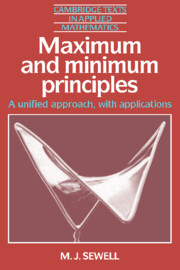5 - Mechanics of solids and fluids
Published online by Cambridge University Press: 12 October 2009
Summary
Introduction
In this chapter we select topics from the mechanics of fluids and elastic and plastic solids, and use them to illustrate ideas introduced previously. In §5.2 we review some Legendre transformations of classical thermodynamics in the light of Chapter 2, exhibiting quartets and isolated singularities associated with phase changes. For compressible flow another Legendre transformation, involving a swallowtail flow stress function which plays the role of a complementary energy in the sense of Fig. 2.27, is displayed in Fig. 5.3.
Subsequently we begin each of a number of contexts with a statement of the general boundary value problem, in terms of the ab initio kinematic and force variables. Then we obtain, for example, stationary principles and upper and lower bound theorems at that level of generality. This is in contrast to our previous illustrations, which usually began with a differential or integral equation for a single unknown variable, presumed to have resulted from some combination and elimination of ab initio variables.
This chapter shows that theories of considerable algebraic complexity can be well organized within the general framework developed in Chapters 1–3. Many other examples in continuum mechanics could be given.
Thermodynamics
(i) Thermodynamic potential functions
This is the obvious classical illustration of Fig. 2.18. We use certain terminology and notation which have become familiar for the context, in order to aid the reader's comparison of our treatment with what he may already know.
Information
- Type
- Chapter
- Information
- Maximum and Minimum PrinciplesA Unified Approach with Applications, pp. 353 - 443Publisher: Cambridge University PressPrint publication year: 1987
